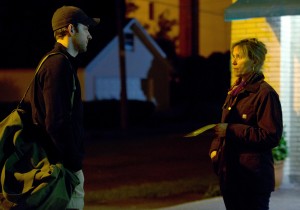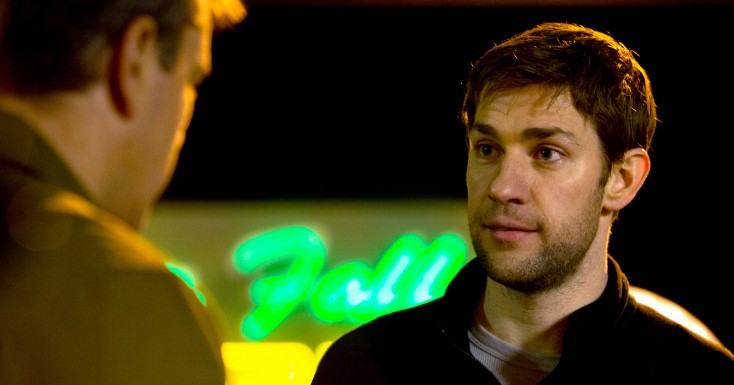
(l to r) John Krasinski stars as Dustin and Frances McDormand stars as Sue in Gus Van Sant’s “Promised Land.” ©Focus Features. CR: Scott Green.
By ANGELA DAWSON
Front Row Features
HOLLYWOOD—John Krasinski is best known for playing the nice guy Jim Halpert on “The Office.” But with that popular series winding to a close with its ninth and final season, Krasinski, who is married to British actress Emily Blunt, is considering his next career move.
Planning ahead, the boyishly handsome actor has been dabbling in screenwriting, which he studied while attending Brown University.
His debut effort, “Promised Land,” is paying off in a big way, having opened in limited release to mostly positive reviews. Working with successful author Dave Eggers on the story, and subsequently writing the script with acclaimed actor Matt Damon (who co-wrote with Ben Affleck the Oscar winning screenplay “Good Will Hunting”), Krasinski can proudly add “screenwriter” to his list of talents.
The Newton, Mass., native says it was a worthwhile process, one in which he was able to tap into his father’s blue-collar roots to the tell the story of a struggling small town faced with the decision of selling its natural gas rights to a big energy company.
Krasinski and Damon play rivals battling for the hearts and minds of a community, with Krasinski playing an environmentalist warning of the dire consequences of selling its drilling rights to the company to conduct hydraulic fracturing, a controversial process in which water, sand and chemicals are pumped underground to break up rock and release natural gas, while Damon plays a slick salesman promising financial benefits for the economically depressed community. Gus Van Sant, who directed Damon in “Good Will Hunting,” helms “Promised Land.”
Despite their onscreen animosity, the two Beantown natives got along swimmingly as they spent weekends co-writing the script at Damon’s kid-filled home, even watching “The Little Mermaid” together.
Q: What inspired you to write this screenplay?
Krasinski: I had been thinking about a lot of things that mean a lot to me, and one of the things that means the world to me is my dad. He grew up in a small steel town just outside of Pittsburgh. He worked three jobs, and his family didn’t have a whole lot. When he talked about his childhood, he always was so bright and positive, though. I remember as an ignorant eight-year-old saying to him, “So your childhood must have been awful?” and he’d say, “No, it was fantastic. We had an incredible community of friends and family and there was this belief that tomorrow was going to be a better day.” That pure idealistic view stuck with me throughout my life. I know it’s been the core of any positive upbringing that I’ve had. So, as I grew older, I realized that, as a country and as a people, we’ve sort of moved away from that ideal of community and the strength we have together. That was the story I wanted to tell. I wanted to tell a story of a community like my dad’s that is going through tough times.
Q: When did the idea of fracking enter the picture?
Krasinski: That came a little later. We found it in some research and reading this drilling down series in the “New York Times.” “60 Minutes” had done a piece about people who were literally turning into millionaires overnight (by selling natural gas rights to their land). So we thought, this is it. This is the backdrop we can put into the story we already have. It’s a really high stakes poker issue in that there is so much potentially to gain and so much potentially to lose. For us, the beauty of it was that it was a human story. These people who have so much at stake have to make a really tough decision.
Q: What was it like filming in rural Pennsylvania where this is a real issue?
Krasinski: I remember when we rolled into town, the people were kind and generous to let us in but really they weren’t inhibited at all to come up and tell us how they felt. A lot of people were like, “Don’t do this. This is really important to us and it saved us.” We had many people come up to us and tell us that they had farms in their family for 150 years, and they don’t have the money to pay the mortgage anymore. They said, “I don’t want to be the person’s whose name is on the list who gave that property up. I can’t do it.” So when you see what an emotional conflict this is for people, you realize what an incredible opportunity we had to tell their story.
Q: Some might expect this film to take a negative stance on fracking because it’s a Hollywood movie. But you actually point out both the upside and downside of this type of drilling without offering pat answers. How and why did you offer this balanced viewpoint?
Krasinski: It was where we were heading right from the beginning. We always knew it was about community and so if you’re going to tell a story about anything, the one-sided version is always really boring, so we never wanted to tell one side of the story because no story is one-sided. I remember when we started writing it, (the 2010 documentary about the U.S. financial crisis) “Inside Job” came out, which Matt narrated, and I thought that was an incredible correlation to our film. It was this two-sided argument with no one right answer.
Q: How long did it take to write the script?
Krasinski: We got the first draft of the script done in about six weeks. It was definitely a wild beast we hadn’t reigned in all the way.
Q: What was your writing process with Matt like because you co-wrote the script together?
Krasinski: We used one computer. He was shooting “We Bought a Zoo” at the time and I was shooting “The Office,” so we were kind of moonlighting. I would drive to his house every weekend. He wins by default because he has four beautiful daughters. I would show up at his house Saturday morning for breakfast and we would write until dinner. I don’t know how we got all the work done that we did, because we popped in “The Little Mermaid” 17 times.
Q: Was it easy working with him?
Krasinski: We worked really well together. We just clicked. We have a very similar voice and a similar outlook on life in that we are eternal optimists. We knew things that we really loved about movies which again is not one-dimensional characters and the need for humor every step of the way. Otherwise, this would have been heavy handed and no one would want to watch it. The idea that the true story we were telling was about these people. So we just dove in and it worked really well. We would act every part out. I remember Matt saying it was a letdown when we got to set and he was only playing one character. (He laughs.)
Q: How did it feel as a writer to hear the words you’d written spoken by another actor?
Krasinski: Luckily, my scenes were just with Matt for the most part because there were other things going on. So I didn’t have as many opportunities as Matt did to hear someone speak one of my lines. To be honest, this whole experience has been totally surreal. This is a big transitional moment for me with “The Office” ending so I think there is so much more to this experience than this being my first screenplay or getting to work with these great actors.
Q: Matt originally was going to direct this but handed it over to Gus Van Sant because he couldn’t commit the time.
Krasinski: Honestly, it came to a whole new level when Gus came on board.
Q: What is the take away from this movie for the audience?
Krasinski: We’re hoping people will take a minute to realize that we’re all part of a community and we have so much say, and that the days of electing people who will take care of us will no longer happen. This is a much more complicated time and a much more complicated landscape.
Q: You’ve got one more season of “The Office”.” Have you let yourself think about the show ending?
Krasinski: No. I joke around with Matt that it’s a Boston thing that we do where during an emotional moment you say, “No everything is fine,” then at the last minute you get blindsided. I remember when Steve (Carell) was leaving, the time leading up to the last episode, he was on people were getting really emotional, and I remember the last day everyone was crying around me. In my head I was like, “Guys, his contract is up. This is real life. Everybody just calm down.” Then, in the last shot on the show, it was my character saying goodbye to him, so when they said “action,” I just broke down to a pathetic level and I walked over to him and just hugged him, which was not in the script. There is footage somewhere of two grown men having a meltdown. (He laughs.)
Q: You and your wife have really busy careers. Do you try to avoid long being separated for long periods of time?
Krasinski: We try. We’ve been really lucky until the movie she is shooting now (“All You Need is Kill,” with Tom Cruise). The hardest part is when she is shooting in a city like London and I’m still grounded in shooting the show in LA. I will travel anywhere on the weekend to see her but London is tough to do. It becomes that thing when you try as hard as you can and then the universe is going to deal you with whatever you’re going to be dealt. This one was really tough. When you get into four or five weeks without seeing someone as much as you try, it’s that weird thing when you don’t feel anything other than totally missing someone, you’re like: “Wow, this absolutely difficult to get through,” so we try not to do it.
Q: Have you and Emily experienced any culture differences since you’ve married?
Krasinski: Yeah. She’ll say something, and I’ll be like, “I don’t know what that is.” It’s bizarre. There are -isms that she has that are crazy. My favorite thing is when she goes home for a visit her parents are like, “What happened to you? You sound very American.” And when she comes back from London, she sounds to me like a chimney sweep, like Dick van Dyke in “Mary Poppins.” She adapts very well. I’m the same way. I always have a little bit of a Boston accent after I spend too much time there.




